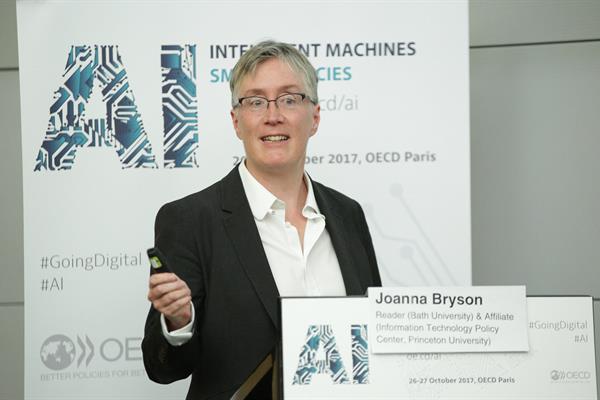
In this talk I will discuss the EU's right, competence, and current attempts to regulate the application of AI within our borders. I will use recent events to reconsider our understandings of rights, sovereignty, and democracy.
Joanna J Bryson is an academic recognised for broad expertise on intelligence, its nature, and its consequences. Holding two degrees each in psychology and AI (BA Chicago, MSc & MPhil Edinburgh, PhD MIT), she is since 2020 the Professor of Ethics and Technology in the Centre for Digital Governance at Hertie School, in Berlin. Bryson advises governments, corporations, and other agencies globally, particularly on AI policy.
Her work has appeared in venues ranging from reddit to the journal Science. From 2002-2019 she was Computer Science faculty at the University of Bath; she has also been affiliated with Harvard Psychology, Oxford Anthropology, The Mannheim Centre for Social Science Research, The Konrad Lorenz Institute for Evolution and Cognition Research, and the Princeton Center for Information Technology Policy. Bryson first observed the confusion generated by anthropomorphised AI during her PhD, leading to her first AI ethics publication “Just Another Artifact” in 1998. She is now a leader in AI ethics, having since coauthored the first national-level AI ethics policy, the UK’s (2011) Principles of Robotics, and contributed to efforts by the OECD, EU, UN, OSCE, Red Cross and Google among others. In June 2020, she was one of nine experts nominated by Germany to the founding cohort of experts for the Global Partnership for AI.
Bryson continues to research the systems engineering of AI and the cognitive science of intelligence. Her present focus is on the impacts of communication and computation technology on human societies, and new models of governance for AI and digital technology, particularly given the transnational nature of many of the institutions providing AI infrastructure.
- Arrangør: Danish Institute for Advanced Study
- Adresse: Fioniavej 34, 5230 Odense M
- Kontakt Email: majul@sdu.dk
- Tilføj til din kalender: https://eom.sdu.dk:443/events/ical/edb911e0-17f5-4893-a4b8-61baa8099192